|
|
|
Sort Order |
|
|
|
Items / Page
|
|
|
|
|
|
|
| Srl | Item |
| 1 |
ID:
171669


|
|
|
|
|
| Summary/Abstract |
The rise to prominence of Daesh and its expert exploitation of extremist propaganda has brought in to focus the role of strategic communications in counterterrorism (CT) and countering violent extremism policy. Nonetheless, strategic communications tends to be discussed largely in relation to counter-recruitment and counter-radicalisation. Using the UK’s CT strategy as a case study, Andrew Glazzard and Alastair Reed argue that strategic communications has a far wider application in CT.
|
|
|
|
|
|
|
|
|
|
|
|
|
|
|
|
| 2 |
ID:
110006


|
|
|
|
|
| Publication |
2011.
|
| Summary/Abstract |
The basic narrative of bargaining theory predicts that, all else equal, anarchy favors concessions to challengers who demonstrate the will and ability to escalate against defenders. For this reason, post-9/11 political science research explained terrorism as rational strategic behavior for non-state challengers to induce government compliance given their constraints. Over the past decade, however, empirical research has consistently found that neither escalating to terrorism nor with terrorism helps non-state actors to achieve their demands. In fact, escalating to terrorism or with terrorism increases the odds that target countries will dig in their political heels, depriving the non-state challengers of their given preferences. These empirical findings across disciplines, methodologies, as well as salient global events raise important research questions, with implications for counterterrorism strategy.
|
|
|
|
|
|
|
|
|
|
|
|
|
|
|
|
| 3 |
ID:
128301
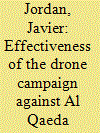

|
|
|
|
|
| Publication |
2014.
|
| Summary/Abstract |
This article examines the effects the drone strike campaign in Pakistan is having on Al Qaeda Central. To that end, it constructs a theoretical model to explain how the campaign is affecting Al Qaeda's capacity to carry out terrorist attacks in the United States and Western Europe. Although the results of one single empirical case cannot be generalised, they nonetheless constitute a preliminary element for the construction of a broader theoretical framework concerning the use of armed drones as part of a counterterrorism strategy.
|
|
|
|
|
|
|
|
|
|
|
|
|
|
|
|
| 4 |
ID:
096753
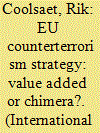

|
|
|
|
|
| Publication |
2010.
|
| Summary/Abstract |
Europe did not wake up to terrorism on 9/11; terrorism is solidly entrenched in Europe's past. The historical characteristics of Europe's counterterrorism approach have been first, to treat terrorism as a crime to be tackled through criminal law, and second, to emphasize the need for understanding the 'root causes' of terrorism in order to be able to prevent terrorist acts. The 9/11 attacks undoubtedly brought the EU into uncharted territory, boosting existing cooperation and furthering political integration-in particular in the field of justice and home affairs, where most of Europe's counterterrorism endeavours are situated-to a degree few would have imagined some years earlier. This development towards European counterterrorism arrangements was undoubtedly event-driven and periods of inertia and confusion alternated with moments of significant organizational breakthroughs. The 2005 London attacks contributed to a major shift of emphasis in European counterterrorism thinking. Instead of an external threat, terrorism now became a home-grown phenomenon. The London bombings firmly anchored deradicalization at the heart of EU counterterrorism endeavours.
|
|
|
|
|
|
|
|
|
|
|
|
|
|
|
|
| 5 |
ID:
158309
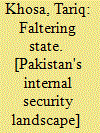

|
|
|
|
|
| Publication |
Karachi, Oxford University Press, 2017.
|
| Description |
xx, 420p.hbk
|
| Standard Number |
9780199404582
|
|
|
|
|
|
|
|
|
|
|
|
Copies: C:1/I:0,R:0,Q:0
Circulation
| Accession# | Call# | Current Location | Status | Policy | Location |
| 059358 | 352.3505491/KHO 059358 | Main | On Shelf | General | |
|
|
|
|
| 6 |
ID:
109072


|
|
|
|
|
| Publication |
2011.
|
| Summary/Abstract |
Though British foreign policy toward Iraq was officially separate from counterterrorism strategy, ideas about the "global war on terror" circulated in both policy milieus. This article deploys the concept of the security imaginary, adding insights from Pierre Bourdieu's notion of the habitus, to explore why this was the case. The British security imaginary, as structured by a secular social landscape coming to terms with "radical Islamism," was beholden to a series of problematic assumptions about religio-politics. This article focuses on British perceptions of the Islamist Jaish al-Mehdi militia between 2003 and 2004. Beyond the Iraq example, this historical incident suggests intimate connections between the experience of domestic secularity and warfare.
|
|
|
|
|
|
|
|
|
|
|
|
|
|
|
|
| 7 |
ID:
092316


|
|
|
|
|
| Publication |
2009.
|
| Summary/Abstract |
Despite the surge of scholarly interest in terrorism and counter-terrorism in the post-9/11 world, surprisingly little attention has been paid to the role of religious actors (especially faith communities and faith leaders) in combating the threat of terrorism. However, the resurgence of religiosity in contemporary politics should not be viewed as an inherently dangerous force. As Appleby has argued, a new secular-religious model of inter and intra-state diplomacy looms as a development with significant potential to resolve conflict and deny terrorist groups access to communities of support. By drawing on an Australian example, we argue that in societies that have a strong multicultural and multifaith character secular-religious diplomacy pitched at the national and sub-national level can play an important role in the formation of a flexible long-term counterterrorism strategy.
|
|
|
|
|
|
|
|
|
|
|
|
|
|
|
|
| 8 |
ID:
140306
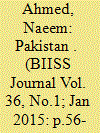

|
|
|
|
|
| Summary/Abstract |
This paper critically examines the counterterrorism strategy of Pakistan, which it adopted after the 9/11 incident, by arguing that so far, it has proved ineffective and counter-productive in uprooting the terrorist network of Pakistan-based militant Jihadi and extremist groups that also have links with Al-Qaeda. In this respect, the paper, besides defining and assessing Pakistan’s counterterrorism strategy, also analyses various factors which have contributed to the inefficacy of the country’s counterterrorism strategy. In the concluding analysis, the paper emphasises upon the need for formulating an effective counterterrorism strategy of Pakistan.
|
|
|
|
|
|
|
|
|
|
|
|
|
|
|
|
| 9 |
ID:
156173
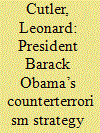

|
|
|
| 10 |
ID:
102665
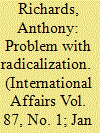

|
|
|
|
|
| Publication |
2011.
|
| Summary/Abstract |
This article questions the utility of the term 'radicalization' as a focus for counter-terrorism response in the UK. It argues that the lack of clarity as to who the radicalized are has helped to facilitate a 'Prevent' strand of counterterrorism strategy that has confusingly oscillated between tackling violent extremism, in particular, to promoting community cohesion and 'shared values' more broadly. The article suggests that the focus of counterterrorism strategy should be on countering terrorism and not on the broader remit implied by wider conceptions of radical-ization. This is not to diminish the importance of contextual or 'root cause' factors behind terrorism, but, if it is terrorism that is to be understood and countered, then such factors should be viewed within the terrorism-counterterrorism discourse and not a radicalization-counter-radicalization one. The article goes on to consider the characterization of those presenting a terrorist threat to the UK as being 'vulnerable' to violent extremism. While it argues that the notion of vulnerable individuals and communities also lends itself to a wider 'Prevent' remit, it cautions that the impetus towards viewing terrorism as the product of vulnerability should not deflect us from what has generally been agreed in terrorism studies-that terrorism involves the perpetration of rational and calculated acts of violence.
|
|
|
|
|
|
|
|
|
|
|
|
|
|
|
|
| 11 |
ID:
178079


|
|
|
|
|
| Summary/Abstract |
Previous explanations on China's counterterrorism strategy have highlighted the results of China's strategy of repression in Xinjiang, the historical antecedents and institutional foundations of its counterterrorism policies, as well as international and domestic sources of China's counterterrorism strategy. While acknowledging the importance of all these dimensions, this article draws attention to a largely neglected feature of China's counterterrorism strategy: the Chinese party-state's social engineering of Xinjiang. Building on Maoist-era practices such as the mass line and the ‘friend vs. enemy’ binary, the Communist party under Xi Jinping has integrated surveillance technologies as part of its strategy of preventive counterterrorism and ‘de-extremization’. This article argues that the Chinese party-state's embrace of modern technologies, a weak liberal tradition in China, Xi Jinping's rise to power in late 2012, and the appointment of Chen Quanguo as Xinjiang's party-secretary in 2016, provides the socio-political background for the intensification of securitization, surveillance and introduction of ‘re-education and training centres’ in Xinjiang. Surveillance technologies now complement collective, face-to-face methods of surveillance and Maoist-era techniques of mass mobilization, enabling the Chinese party-state to govern and manage the biopolitical spaces of Uyghurs with greater intensity, according to the state's precise norms. The legalization and institutionalization of ‘de-extremization’ has also led to the shift from mass ‘de-extremization’ propaganda to ‘drip-irrigation’ ideological and political re-education of individuals deemed at risk of extremism. The result is an increased capacity by the Chinese party-state to surveil and control the region, and to more effectively negate the possibility of individual resistance.
|
|
|
|
|
|
|
|
|
|
|
|
|
|
|
|
| 12 |
ID:
138892
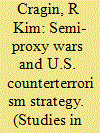

|
|
|
|
|
| Summary/Abstract |
On 4 February 2014, Al Qaeda leaders in Pakistan (aka Al Qaeda Central) repudiated Abu Bakr al-Baghdadi, the leader of Al Qaeda in Iraq. Ayman al-Zawahiri declared that al-Baghdadi and his newly formed Islamic State in Iraq and the Levant (ISIL) were no longer part of Al Qaeda's organization and Al Qaeda Central could not be held responsible for ISIL's behavior. It represents the first time that Al Qaeda Central has renounced an affiliate publicly. The announcement was driven by months of fighting between ISIL and Jabhat al-Nusra, another Al Qaeda affiliate in Syria. In fact, in Syria, Al Qaeda fighters are competing against each other for influence, as well as against other opposition groups, the Syrian regime, the Islamic Revolutionary Guard Corps, Iraqi militiamen, and Lebanese Hezbollah. This chaotic, semi-proxy war is unlike any previous problem encountered, made even more challenging by the limited U.S. presence on-the-ground. More worrisome, this semi-proxy war also has spread beyond Syria. Similar dynamics have emerged in Iraq, Yemen, and Lebanon to a certain extent. This article argues that these dynamics necessitate a twist in U.S. counterterrorism strategy.
|
|
|
|
|
|
|
|
|
|
|
|
|
|
|
|
| 13 |
ID:
074924
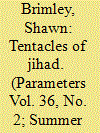

|
|
|
|
|
| Publication |
2006.
|
| Summary/Abstract |
From the suburbs and cities of North America and Europe, to the deserts, jungles, and villages of Africa, the Middle East, and Asia, the "long war" is indeed a global one that has been and will continue to be a challenge for the professionals tasked with waging it. This war is characterized by its transnational nature, and although our military forces are heavily engaged in Iraq and Afghanistan, we must be vigilant in our appreciation of the breadth and depth of the strategic battleground. One gets a sense of the magnitude of the challenge by examining the service and support mechanisms of al Qaeda and its progeny.
|
|
|
|
|
|
|
|
|
|
|
|
|
|
|
|
| 14 |
ID:
110928
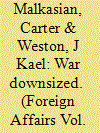

|
|
|
|
|
| Publication |
2012.
|
| Summary/Abstract |
The United States, facing deepening economic and fiscal woes at home, is preparing to withdraw from Afghanistan. More and more policymakers, congressional representatives, and members of the public are calling for the majority of U.S. forces to pull out as quickly as possible and for Washington to shift from an expensive counterinsurgency strategy, in which tens of thousands of U.S. and NATO troops protect the Afghan population, to a cheaper counterterrorism strategy, in which special operations forces strike at terrorist leaders in Afghanistan and Pakistan and the Afghans are left largely on their own.
|
|
|
|
|
|
|
|
|
|
|
|
|
|
|
|
| 15 |
ID:
120800
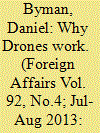

|
|
|
|
|
| Publication |
2013.
|
| Summary/Abstract |
The Obama administration relies on drones for one simple reason: they work. Drone strikes have devastated al Qaeda at little financial cost, at no risk to U.S. forces, and with fewer civilian casualties than many alternative methods would have caused.
|
|
|
|
|
|
|
|
|
|
|
|
|
|
|
|
|
|
|
|
|